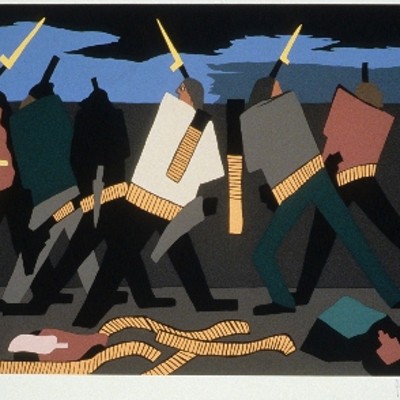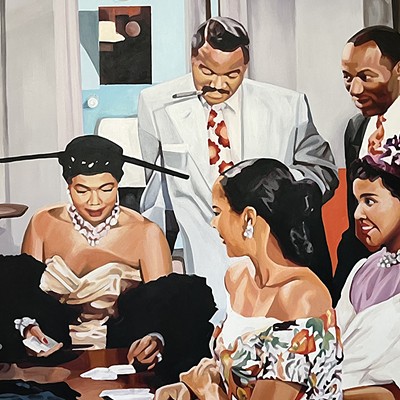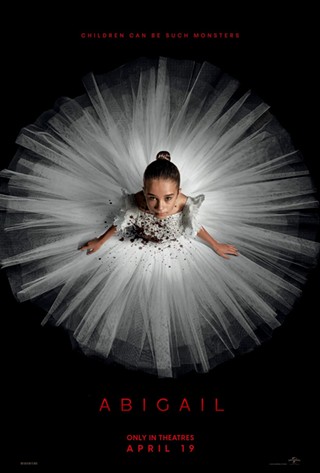It hardly gives anything away to say that America's sunshine gives the movie Angela's Ashes a triumphant ending as well, yet ashes have not been abandoned in the new Alan Parker adaptation. In fact, his gritty film about extreme poverty among the urban Irish of the Depression is full of ashes, not to mention dirt and excrement, all of it continually mucked up by the ceaseless rains of Limerick, a stony city on the cold River Shannon.
Angela, played by Emily Watson, the strapped matriarch of the desperately poor McCourt family, has more than a passing familiarity with ashes long before her ultimate cremation. Her husband Malachy may be too proud to pick up the coal that tumbles off the truck as it makes its rounds to families who can afford a hot fire, but Angela is not. She orders her boys to follow her through the filthy streets, picking up the black chunks that will allow her to warm the kids and heat up what little food there is. The view of her figure bent over the sooty cobblestones, her kids fumbling the precious coal in their freezing hands, is a classic image of poverty.
If McCourt's book was celebrated for its language, the movie deserves praise for its stark visuals, captured by cinematographer Michael Seresin. This is no pretty green Irish movie: it's a city film though and through, starting in a dark Brooklyn tenement and then removing to the gray Limerick slums. It was shot in the "new" Ireland, whose economic resurgence made it difficult to find locations shabby enough to meet the McCourt standard of the 1930s.
Still, with the help of studio reconstructions of Limerick's now-demolished "lanes" and shots of Cork's better-preserved cobble streets, the Parker film is a faithful adaptation. The best-selling memoir won a slew of prizes, including a Pulitzer, but its author had no part in writing the screenplay. Parker, who directed the hilarious Irish movie The Commitments, along with such standard fare as Evita, gets co-writing credit with Laura Jones, an Australian who wrote An Angel at My Table. A narrator, though, mingles the best of McCourt's writing with the filmmaker's.
The movie opens with the relentless rains of Limerick pouring down on the narrow streets. A voice-over of the book's prologue alerts audiences to the devastation to come. "It was of course a miserable childhood: the happy childhood is hardly worth your while. Worse than the ordinary miserable childhood is the miserable Irish childhood, and worse yet is the miserable Irish Catholic childhood."
Despite its title, the story is really Frank's. He's wonderfully played by three young Irish actors in succession, best of all by 8-year-old Joe Breen, a farmer's son who had never acted prior to this role. Silently, Frank takes in the disasters all around him, his staring eyes registering the loss of the family's three young babies in succession, his father's irresponsibility, the constant hunger, the indifference of priest and relatives alike.
The boy's ambivalence toward both parents keeps his story from turning maudlin. He loves his father, teller of tales and singer of songs, but he's baffled by Dad's permutations and, as he grows older, increasing bitterness. Alcohol, as he says, turns Malachy into a version of the Holy Trinity, three different men in one body. With the dawn of each new morning, he's full of hope and gab. By day, suited up in coat and tie, he roams the town looking for work, more forlornly as the hours drag on. By night, he's drunk in the pub, spending what few coins the family gets from the dole. He comes home late, clattering on the stairs and more than once knocking over the slops bucket. On a burial day, he takes his pint on the coffin of his own child.
Robert Carlyle, who played a similarly engaging rake in The Full Monty, seemed a perfect choice for the part, but his performance here is disappointingly subdued. He never fully becomes the extravagant Malachy, the flamboyant alcoholic at once full of love and heedless of responsibility.
Emily Watson, most recently seen as the cellist Jacqueline du Pré in Hilary and Jackie, is a wonderfully complex Angela. She doesn't care if she humiliates Frank; she's determined to do whatever it takes to keep the family's body and soul together, picking up coal, begging for furniture from the officious St. Vincent de Paul Society, copping leftovers from priests. Watson's Angela, burdened by her pack of kids (she gave birth to seven), is not as loquacious as her feckless mate, but she speaks loudly with her silent looks. In the scene where she hears the teenage Frank coming home drunk for the first time, just like his father, pain ripples across her face. She does get some good lines, as when she notes with sharp wit that God has not been seen much lately in the lanes of Limerick.
The Catholic Church gets a fair drubbing in this tale of a land that James Joyce once denounced as "priest-ridden." With one exception, the priests who encounter the desperate McCourts have little of Christ's compassion. They're prim, middle-class snobs who want no truck with their impoverished parishioners. A priest slams the rectory door in Malachy's face when he proudly brings round his smart son, versed in Latin, to become an altar boy. A Christian Brother slams another door when Angela brings the boy to apply for a scholarship.
Likewise, the schoolmasters are routinely cruel, but they're the ones who provide Frank with a love of literature as well as hope of redemption. It's education, not religion, that will save him. One denounces a class system that keeps a higher education out of reach of poor kids. "Go to America," is the schoolmasters' advice to McCourt, and the idea becomes a kind of mantra for the boy.
This being an Irish movie, there's plenty of humor to soften the hardness, as in the improbable escapade when young Frank vomits up God himself on the morning of his First Communion. Verbal pyrotechnics abound. When a schoolteacher berates the boys for teasing Frank about his tire-patched shoes, he fluidly scolds them: "You didn't see Our Lord sporting shoes on the cross." Frank himself uses his growing gift for language to write dunning letters for the evil money-lender, picking up pence to fund his fixed idea of coming to America.
The movie can be read as a classic immigration saga -- sunny America indeed is to provide young Frank a refuge from sodden Ireland -- but it's not as simple as New World Good, Old World Bad. The tragedy of the McCourts lies not just in Malachy's failures to his family, but in the indifference of their communities on both sides of the sea.
Angela's Ashes opens Friday at Century El Con (202-3343) and Foothills (742-6174) cinemas.














